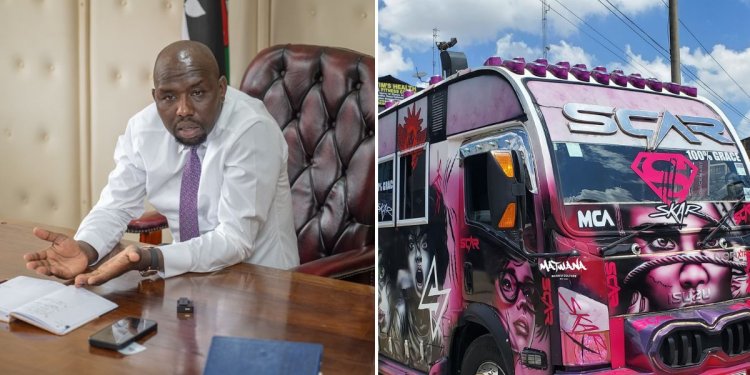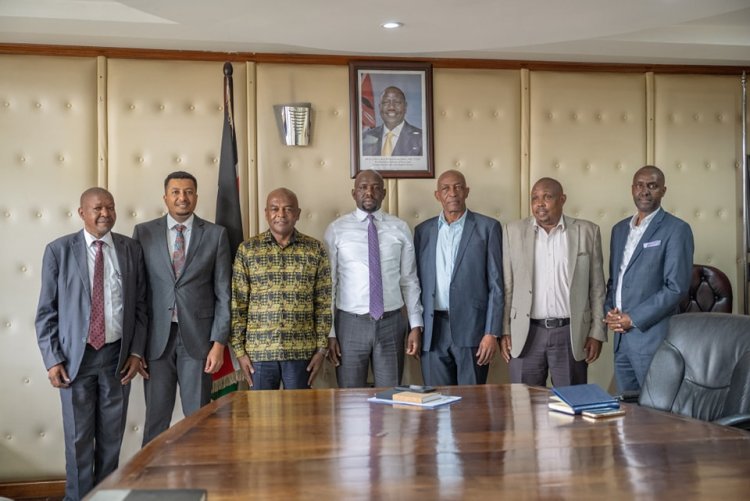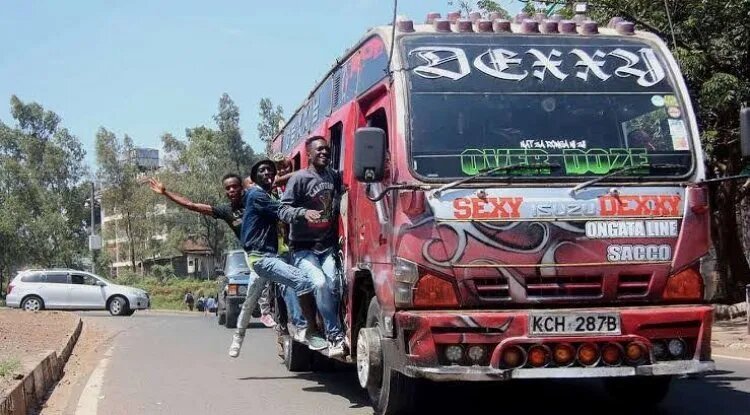Murkomen Plots Extreme Makeover Of Kenya's Matatu Industry
Murkomen met officials of the Matatu Owners Association (MOA) with the aim of coming up with methods of professionalising the matatu sector.

Transport Cabinet Secretary (CS) Kipchumba Murkomen is targeting a complete overhaul of Kenya's matatu industry in a bid to enhance customer service as well as improve working conditions for employees.
The CS in a statement on Thursday, November 23 hailed the booming industry as an essential driver of Kenya's economy, generating over Ksh200 billion in revenue annually.
The industry also offers direct and indirect employment to over 1 million people, including drivers, conductors, graffiti artists, interior designers, spare part dealers, mechanics, car wash attendants, among others.
Murkomen met officials of the Matatu Owners Association (MOA) with the aim of coming up with methods of professionalising the matatu sector.

Transport CS, Kipchumba Murkomen with officials of the Matatu Owners Association (MOA) on November 23, 2023. /KIPCHUMBA MURKOMEN
"In my meeting with officials of the Matatu Owners Association (MOA) at Transcom House this morning, we explored a myriad of ways through which we can streamline and professionalise the industry and transform it from an informal to a formal sub-sector regulated by set codes of conduct and policy guidelines that would create better working terms for employees, uphold professionalism in the handling of passengers and promote efficiency in its management and operations.
"We will be engaging further with all industry players and the public to concretise agreeable reforms that would enhance proficiency, safety and reliability, and turn the industry - which is responsible for the transportation of over 70% of Kenyans - into a treasure trove of opportunities," stated the CS.
The meeting was attended by Transport Principal Secretary (PS) Mohamed Daghar, MOA President Albert Karakacha, and other officials from the State Department for Transport and MOA.
The term matatu refers to privately owned public service vehicles that serve as the primary mode of transportation for many Kenyans, especially in the capital city, Nairobi. According to reports, almost 85% of Nairobi’s population relies on public transportation.
Because of its heavy usage, the matatu culture emerged and manifested into a staple among the youths who prefer the unique culture, a vibrant and unique phenomenon that has been growing since the 1960s and which has become a source of pride for Kenyans.
Graffiti artists have been driving this industry by creating unique designs that reflect pop culture, including musicians, footballers, slogans, and sayings.
The matatu culture embraces different types of graffiti, and young people in Kenya are increasingly preferring these pimped-out buses over traditional ones, even though they charge more fares than the old buses.
The graffiti culture in Matatus has become so popular that it has spurred local art and has become a way for artists to showcase their work.
The PSVs are also modified with other elements such as sound systems, free WiFi, comfortable seats, loud music, CCTV fitted inside, and flat-screen televisions as well as other interior fabrication, all of which could cost as much as Ksh300,000 depending on the modifications. This in turn creates employment for young people who work on the interior & exterior fabrications as well as the graffiti.
However, the customised matatus are known for vices such as touts seen hanging dangerously on the door of the moving vehicle as they pick up passengers during rush hour, overlapping in traffic and breaking traffic rules to beat the competition, resulting in criticism towards the matatu sector due to its unconventional and rowdy nature.
The sector has also been infiltrated by cartels and its governance has given the state headaches for years. In 2020, the National Transport and Safety Authority (NTSA) carried out an audit of SACCOs operating in the sector in an attempt to kick out the cartels.
Part of the changes at the time included writing contracts for individuals offered employment directly in the sector including drivers, touts, and managers of the SACCOs.







